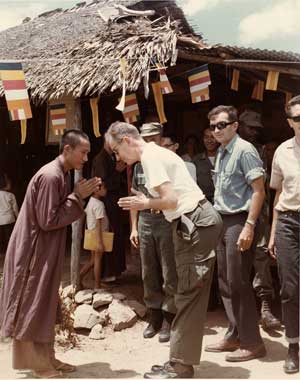As you have read in Senator Case's biography, he took a trip to South Vietnam in May 1967. What follows are documents and photographs related to the CODEL (congressional delegation) trip that Case took (interestingly the other members of Congress who were supposed to go backed out, leaving Case as the only member of Congress in the "delegation"!). It is by 1967 that we have strong evidence of a clear shift in opinion on the function of the United States' military policy in Vietnam.
In this activity you and a small group of friends are going to sleuth around documents and photographs below to determine what is influencing Senator Case's evolving position. Create talking points for each of these questions and be prepared to direct your peers to your evidence.
- Who is Senator Case interacting with on this trip (not names but the demographics of the people)?
- Look at the itinerary. What was Senator Case looking to learn about the Vietnam War?
- Evaluate the itinerary. Do you feel that it was a balanced look at the Vietnam conflict? Use photographic or documentary evidence to explain your position.

Senator Case greeting Vietnamese Buddhist monk, Clifford Case Papers, Rutgers University Libraries
Links to Maps
- Southeast Asia. View now or open the PDF version (0.1MB)
- South Vietnam. View now or open the PDF version (0.1MB)
Links to Documents and Photographs
- Speech from July 16, 1965 regarding the Vietnam War. View now or open the PDF version (0.5MB)
- Photographs from Senator Case's trip to Vietnam in May, 1967. View now or open the PDF version (0.6MB)
- Senator Case's Itinerary. View now or open the PDF version (0.5MB)
- Revised Schedule for Visit of Senator Clifford Case May 13-20 View now or open the PDF version (0.5MB)
Activity III — Just the Facts
This activity is designed to focus on primary document skills development rather than content.
- Provide students with the materials for this activity if they do not have access to Electronic New Jersey.
- To complete the activities in this unit students must be familiar with the Cold War foreign policy of the United States and understand why the United States became militarily involved in the post-World War II conflicts in Indochina, including the conflict that would become the Vietnam War. They must also understand the Tonkin Gulf Resolution and the ramifications of the Congress' decision to pass it.
- Direct students to the "Just the Facts" section of Electronic New Jersey. Students will see the following text along with maps of Southeast Asia and South Vietnam
As you have read in Senator Case's biography, he took a trip to South Vietnam in May 1967. What follows are documents and photographs related to the CODEL (congressional delegation) trip that Case took (interestingly the other members of Congress who were supposed to go backed out, leaving Case as the only member of Congress in the "delegation"!). It is by 1967 that we have strong evidence of a clear shift in opinion on the function of the United States' military policy in Vietnam.In this activity you and a small group of friends are going to sleuth around documents and photographs below to determine what is influencing Senator Case's evolving position. Create talking points for each of these questions and be prepared to direct your peers to your evidence.
- Students are to examine the following documents and photographs related to Senator Case's trip to Vietnam in May 1967
- Speech from July 16, 1965 regarding the Vietnam War
- Photographs from Senator Case's trip to Vietnam in May, 1967
- Senator Case's Itinerary
- Revised Schedule for Visit of Senator Clifford Case May 13-20
- Using the document and photograph analysis forms from the National Archives students are to come up with responses to the following in small group investigations:
- Who is Senator Case talking to (not names but the demographics of the people)?
- Look at the itinerary. What was Senator Case looking to learn about the Vietnam War?
- Evaluate the itinerary. Do you feel that it was a balanced look at the Vietnam conflict? Use photographic or documentary evidence to explain your position.
- Have the small groups report out their findings to the class. At this time students should have access to the documents and photographs so that they can refer their peers to elements used in their analyses.